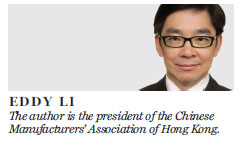We must restore our reputation for tourism
Updated: 2015-05-08 07:44
By Eddy Li(China Daily)
|
|||||||
Because of growing concern over the city's capacity for handling visitors, and issues relating to parallel trading, Hong Kong has proposed some sensible changes to the individual visit scheme. These have been approved by the central government. Last month, Shenzhen authorities announced that multiple-entry individual visits for Shenzhen residents would now be limited to only one visit a week.
I still have some reservations about this change in policy because not all visitors with multiple-entry endorsements are engaged in parallel trading. Indeed, only a small number of parallel traders actually operate here. Therefore, the change to the policy will inevitably cause inconvenience for those going about their normal activities - such as conducting business, visiting and commuting. Of these, those for whom it will be most problematic will definitely be the children of non-permanent resident parents. According to statistics collected by the Shenzhen General Station of Exit and Entry Frontier Inspection, as of July 2014, there were about 16,000 of these children. With children crossing the border to school every day, their parents often hold multi-entry visas. If the "one visit per week" policy is fully implemented, any emergency at school will cause trouble for parents. This is because they cannot re-enter Hong Kong during that week.
Moreover, as Hong Kong-Shenzhen cooperation increases, many Shenzhen residents might choose to meet in Hong Kong to visit exhibitions, have business meetings and so forth. As mentioned in my previous commentary, Hong Kong is an important part of the Guangdong-Hong Kong-Macao "big bay" area. This will be facilitated by cooperation between Hong Kong and the mainland. Restrictions on multiple-entry visits might also affect normal communication.
Parallel trading ultimately exists because of its financial benefits. In fact, many such traders are Hong Kong residents, whose exit/entry behavior is not limited by "one visit per week" or other restrictions. For this reason, the potential impact of the new policy upon parallel trading is uncertain. The new measures do seem to have ended aggressive and unreasonable behavior conducted by the anti-parallel trading protesters. They now have no excuse for causing trouble.
Both the SAR and Shenzhen governments have to monitor and regularly review the "one visit per week" policy. This is to avoid the prospect of a negative impact on the public. The most effective way to deal with parallel trading is to ensure people on both sides can only travel on a round-trip for one day at the most.
Although the unpopular protests have temporarily stopped because of the new measures, Hong Kong's tourist industry still needs to recover from its recent problems. The Hong Kong Tourist Board announced that it was cooperating with the retail industry to launch a series of activities. These include the "HAPPY@hongkong super JETSO" and "Hong Kong Summer Fun". This is to provide discounts and lucky draws for tourists. It also aims to rebuild the city's reputation for hospitality and attract more visitors to Hong Kong.
I appreciate these initiatives taken by the department to boost tourism, but feel they are insufficient for addressing the current situation. The reason for this is that all the "special treatment" now being introduced, will be unnecessary.
We don't need special remedies to heal our wounded tourist industry. The scars will remain for a long time. Society has to pay for the mistakes committed by a small group of people.
Other than the efforts by the government and the industry, the public can also make a contribution to remedying the situation. The enthusiasm and cooperation of the public can help reshape Hong Kong as an international tourist resort.

(China Daily 05/08/2015 page10)